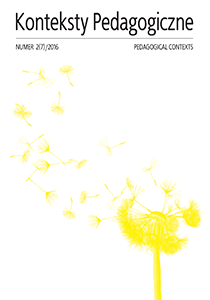Abstract
he article concerns learning difficulties and learning failures. Study presented by the author is a presentation of the results of the research that was aiming to diagnose students and teachers’ opinion about the reasons of the oc-currence of the discussed issue. Research provided interesting information about students and teachers’ view on environmental, educationally-pedagogical and biopsychic conditioning of learning difficulties.
References
Bogdanowicz M., Ryzyko dysleksji, dysgrafii i dysortografii,specyficznych trudności w czy-taniu i pisaniu. Skala ryzyka dysleksji wraz z normami dla klas I i II, Gdańsk 2011.
Czajkowska I., Herda K., Zajęcia korekcyjno-kompensacyjne w szkole, Warszawa 1998.
Dąbrowska-Jabłońska I., Trudności w uczeniu się, [w:] Encyklopedia pedagogiczna XXI wie-ku, t. 6, red. T. Pilch, Warszawa 2007.
Dyrda B., Zjawisko niepowodzeń szkolnych uczniów zdolnych. Rozpoznawanie i przeciw-działanie, Kraków 2007.
Gindrich P.A., Funkcjonowanie psychospołeczne uczniów dyslektycznych, Lublin 2002.
Karpińska A., Minimalizacja drugoroczności – realia, warunki i szanse, Białystok 1990.
Kojs W., Wokół pojęcia niepowodzeń szkolnych,[w:] Niepowodzenia szkolne, red. J. Łysek, Kraków 1998.
Kowolik P., Niektóre zabiegi profilaktyczno-terapeutyczne szkoły w stosunku do uczniów mających trudności w nauce, [w:] Niepowodzenia szkolne, red. J. Łysek, Kraków 1998.
Kozieł B., Spostrzeganie niepowodzeń szkolnych przez nauczycieli, uczniów i ich rodziców, Toruń 2011.
Krasowicz-Kupis G., Psychologia dysleksji, Warszawa 2008.
Kupisiewicz Cz., Niepowodzenia szkolne,[w:] Encyklopedia pedagogiczna XXIwieku, t. 3, red. T. Pilch, Warszawa 2004.
Lewowicki T., Niepowodzenia szkolne, [w:] Niepowodzenia szkolne, red. J. Łysek, Kra-ków 1998.
Łuczak B., Niepowodzenia w nauce. Przyczyny, skutki, zapobieganie, Poznań 2000.
Okoń W., Nowy słownik pedagogiczny, Warszawa 2001.
Oszwa U., Specyficzne trudności w uczeniu się matematyki u dzieci,[w:] Neuropsychologia kliniczna dziecka. Wybór zagadnień, red. A. Borkowska, Ł. Domańska, Warszawa 2006.
In accordance with the recommendation of the Ministry of Science and Higher Education, which aims to counteract the practice of “ghostwriting” and “guest authorship,” all authors submitting their text for publication should attach an author’s statement which declares the contribution of each of the authors to the article. The printed and signed statement should be delivered by mail or other means to editor-in-chief Joanna Skibska or sent in the form of a scan to the following e-mail address: redakcja@kontekstypedagogczne.pl. The authors will not receive remuneration for publishing their papers. The editors reserve the right to make minor editorial changes to the articles which will not affect the substance of the article. We encourage all authors to prepare their articles in accordance with the guidelines for manuscript preparation. Download pdf file.
Authors transfer all copyrights and grant the journal the right of first publication with the work simultaneously licensed under a Creative Commons Attribution License that allows others to share the work with acknowledgement of the work's authorship and initial publication in this journal. All authors agree to the publishing of their email addresses, affiliations and short bio statements with their articles during the submission process.

